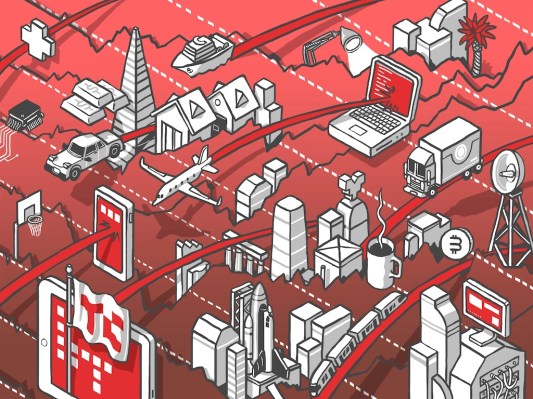Robotic process automation (RPA) unicorn UiPath last night priced its IPO at $56 per share, above its raised price target range of $52 to $54. The company sold 9,416,384 shares at that price, alongside 14,474,393 from existing shareholders. Its underwriters can purchase 3,583,616 shares at its IPO price if they so choose.
UiPath raised $527.3 million on a gross basis for the primary shares that it sold in the transaction, a deal that values the company at around $29.1 billion on a nondiluted basis. On a fully diluted basis, The Exchange calculates that UiPath is worth up to $31 billion.
The Exchange explores startups, markets and money. Read it every morning on Extra Crunch or get The Exchange newsletter every Saturday.
UiPath’s pricing run has been fascinating to watch. The company first proposed a $43 to $50 per-share IPO price range; at that price, UiPath was worth $22.2 billion to $25.8 billion on a nondiluted basis. A coup? For a company that valued at just over $10 billion a year ago, you’d think so. The company’s final IPO price is nearly a tripling of its 2020 worth.
But for UiPath, things are complicated by a 2021 private round that valued the company at $35 billion, a figure that weighs somewhat heavily around the company’s neck.
 Not that we should hold the final down-round IPO price differential against UiPath. It got away with raising $750 million at an inflated price before turning around and raising another half-billion at a more reasonable (more on that in a moment) valuation while providing all but its very final investors with excellent returns.
Not that we should hold the final down-round IPO price differential against UiPath. It got away with raising $750 million at an inflated price before turning around and raising another half-billion at a more reasonable (more on that in a moment) valuation while providing all but its very final investors with excellent returns.
Its employees should do well, too, I reckon. (And Alphabet. Perhaps the company can now afford to bring more of its contractors on full-time thanks to, say, the nearly 21x return that its late-stage group CapitalG made on the 13 million UiPath shares it purchased during its Series B.)
Regardless, after watching the UiPath IPO pricing dance from its first S-1 filing through settling at $56 per share, I think the only parties that should feel a bit silly are the investors who decided that pushing up the value of the former startup by 3.5x in a less than a year was durable logic. Let’s talk about why.
Insanely valuable, just not that insanely valuable
The most recent data we have for UiPath concerns its quarter that ended January 31, 2021. During that period, the company posted revenues of $207.9 million and net income of $26.3 million. UiPath did not disclose its EBITDA or adjusted EBITDA in its S-1 filings because it is a serious company and not one concerned with the accounting equivalent of Facetune. Finally, UiPath’s most recent quarter’s revenue growth came out to 81%.
We’ve looked into comps before for the company but forgot to take into account gross margins. Looking at a list of comparable companies, Crowdstrike seems to be a conservative choice. It is growing less quickly (74.2%), has slimmer gross margins (74.8%), and is worth around 43x its current run rate.
At that multiple, UiPath’s most recent run rate of around $831 million would be worth around $36 billion. You can sort of see, then, why the company’s private investors earlier this year might have priced the company where they did; perhaps a better question would be why UiPath was worth just $10 billion last year. Frankly, though, we both know that the argument there is lower revenues and a slightly different cloud valuation market.
And yet the company is not worth $36 billion, as we might have expected, but at a figure below $30 billion.
What gives? The IPO market, I think. Crowdstrike has been in the market for some time and has a history of kicking the hell out of its earnings reports. That regular performance helped earn it the fourth highest run-rate multiple that the Bessemer Cloud Index tracks, despite perhaps lesser metrics than we might otherwise anticipate.
At $29.1 billion, UiPath has a roughly 35x run-rate multiple. That just about ties it for eighth-best overall. Among all public cloud companies. That means that UiPath is insanely valuable, just not that insanely valuable.
So what went wrong with the company’s final private round? My hunch, based on watching the IPO market more closely than I’d like to admit over the past few quarters, is that UiPath’s final private investors expected the market to stay as hot as it once was, but it has cooled since the first two months of the year. So, instead of UiPath coming to the market in the expected climate, the company instead had to price where it did because the weather predicted by its final private price had already chilled.
Those investors gambled, in other words, hoping that a last-minute, pre-IPO round could snag them a rapid return on a company going public in a hot market. That didn’t work out.
And how bad is that? Not very! Honestly, this is the weirdest down-round IPO that I can remember because I simply don’t think the company in question looks bad. Down-round IPOs like what Casper underwent last year are what a fuckup looks like. UiPath’s IPO is more a meeting of private-market exuberance and modestly more conservative public markets. It’s nothing to cry about.
